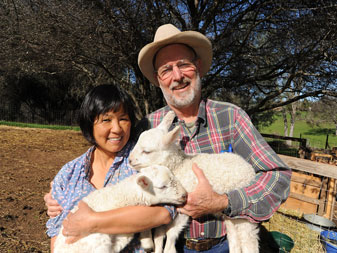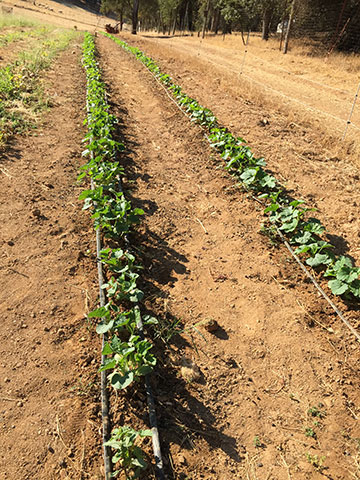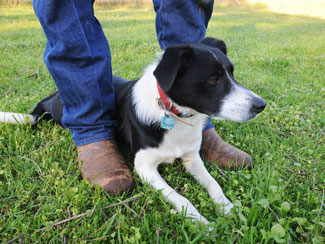 “Farming looks mighty easy when your plow is a pencil and you’re a thousand miles from a cornfield.” —Dwight D. Eisenhower
“Farming looks mighty easy when your plow is a pencil and you’re a thousand miles from a cornfield.” —Dwight D. Eisenhower
Dick Blair and Betty Hui are second-career farmers. Blair spent 35 years as a Bay Area litigation attorney, and Hui is Key Account Manager at The FruitGuys in South San Francisco. When they purchased an old fruit and vegetable farm in El Dorado County, they had no real intention of becoming farmers. But as Blair says, farming is a slippery slope.
“Initially I had no thought of farming, but with the extensive farm infrastructure here, deer fencing, irrigation, and a well, as well as existing table-grape vines and some fruit trees—one thing led to another,” he told The FruitGuys Magazine. That is, pumpkins led to melons, and tomatoes led to lambs and eggplants.
Now retired, Blair farms full-time; Hui farms in her time off.
No longer the greenhorns they were when we first interviewed them in 2011, Hui and Blair have continued to learn and evolve. They bought a flock of lambs in 2013 and have since graduated to breeding their own stock. Chickens provide eggs that Hui sells to her colleagues at The FruitGuys.
The couple calls their farm “Bear Track” because black bears have been spotted there, and it is off the beaten track—140 miles northeast of San Francisco—situated in Garden Valley, CA, in the foothills of the Sierra Nevada range.
While their farm is not certified organic, they employ organic farming practices. In addition, they work to maintain a healthy ecosystem, eliminating invasive species such as star thistle, Scotch broom, goat’s head, and medusahead grass. Yet even with all of the bending, stooping, squats, and heavy lifting that farming entails, “We still go to the gym, and hike and bike to get our aerobic exercise,” Hui said.
 A Tough Row to Hoe
A Tough Row to HoeBut it’s not all about the lambs at Bear Track Farm: The couple’s very first harvest, back in 2011, was two thousand sugar pie pumpkins (“Beginner’s luck,” says Blair), and they continue to experiment with row crops. This year they planted Tasty Bites palm-sized cantaloupes, Persian cucumbers, tomatoes, eggplant, and zucchini.
Blair says failure is one of the essential teaching tools of farming. “I thought that transplanting the melon seedlings would be better [than planting seeds], but it was incredibly labor-intensive and we would have been better to start off from seed.”
But the satisfaction of their successes far outweighs any frustration or setbacks from the failures. The first birthing season for their lambs was a case in point. “Last January/February we had our yearling ewes give birth, and we had to assist in the births of five and pull them out. They all lived, moms and babies,” says Blair. “You can tell when the ewes are getting ready to give birth because their udders ‘bag up’ [become very swollen], and they typically leave the flock and nest. When they go into labor, the hooves present first. You set the clock, and if that lamb is not out within 30 to 60 minutes, then you help out. One time I had a neighbor talk me through a difficult delivery of twins. Our vet and neighbor have really taught us a lot.”
As with all California farms, coping with the extensive drought and the increased threat of wildfires has become the new normal. Hui and Blair are lucky in that their farm came with wells that just needed a little TLC. Even so, they switched to dry farming for their grapevines and found that the vines thrive. “They’re old vines—their roots run deep,” says Hui. They also rotate their sheeps’ grazing areas to keep the grass and brush down and reduce fire danger.
 Blair and Hui said the support of their farmer neighbors has made all the difference in their ability to make Bear Track a viable farm. Blair says it’s still a work in progress, but their proximity to the University of California, Davis, one of the nation’s premier agriculture universities, as well as support from their local Farm Bureau, have all been crucial to their farm’s development. And they did send one of their employees to off-site training: Sugar, their border collie, went to herding school in Idaho and came back an ace. Also on sheep security staff is Pierre, a Great Pyrenees. The area is home to many mountain lions, coyotes, and bobcats, but to date, they have had no losses to predators, though one lamb did die of a rattlesnake bite.
Blair and Hui said the support of their farmer neighbors has made all the difference in their ability to make Bear Track a viable farm. Blair says it’s still a work in progress, but their proximity to the University of California, Davis, one of the nation’s premier agriculture universities, as well as support from their local Farm Bureau, have all been crucial to their farm’s development. And they did send one of their employees to off-site training: Sugar, their border collie, went to herding school in Idaho and came back an ace. Also on sheep security staff is Pierre, a Great Pyrenees. The area is home to many mountain lions, coyotes, and bobcats, but to date, they have had no losses to predators, though one lamb did die of a rattlesnake bite.
 Both say one of the greatest benefits of their new life is entering into the beauty and solitude of their farm. The couple has built a family tent cabin so guests can join them in shinrin-yoku—a Japanese practice of connecting with nature for its restorative qualities. As Hui says, “Bear Track Farm is like shinrin-yoku. I think Dick and I experience that every day on the farm with our animals. After a long day, we love to sit in the middle of the field and absorb all the sights and sounds. Sugar and Pierre sit beside us and do the same.”
Both say one of the greatest benefits of their new life is entering into the beauty and solitude of their farm. The couple has built a family tent cabin so guests can join them in shinrin-yoku—a Japanese practice of connecting with nature for its restorative qualities. As Hui says, “Bear Track Farm is like shinrin-yoku. I think Dick and I experience that every day on the farm with our animals. After a long day, we love to sit in the middle of the field and absorb all the sights and sounds. Sugar and Pierre sit beside us and do the same.”
For Blair, farming is as satisfying as his decades in court—if not more. “At the end of the day I’m really dirty, tired, and satisfied,” says Blair. “Those first lambs I helped pull out when it was getting dark and raining, and you help the lamb out, and then the mother ewe starts licking and cleaning it, and before you know it, it’s struggling to get on its feet and searching for the udder—to be part of that natural process is amazing. I really do love it.”
Want farm-fresh fruit?
We've got you covered.
Heidi Lewis writes about farms, bees, and fruit from her home in Sonoma County, CA. She’s been with The FruitGuys since they were FruitKids.
"*" indicates required fields
Take advantage of faster checkouts and other great benefits.
Create an AccountWe are here to help you provide healthy food, meaning, and a reason to gather in your workplace.
From weekly mixed fruit for break rooms to monthly gifts for remote staff to special projects, we can serve your needs or turn your dreams into a nourishing reality.
Get your weekly dose of the latest fruit info and exclusive updates.
"*" indicates required fields

